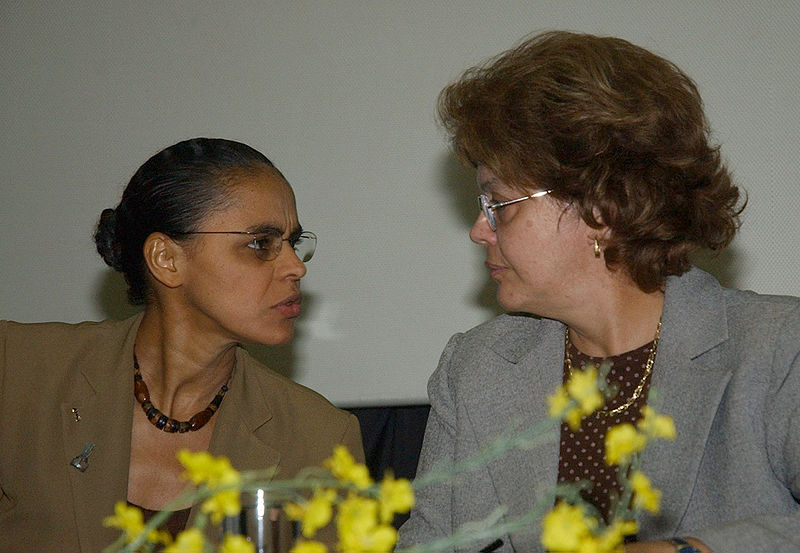The first round of Brazil’s presidential election is just days away and the stakes are rising for investors. With incumbent President Dilma Rousseff gaining ground on her key rival, business-friendly Marina Silva, global investors have lost much of the confidence originally gained when Silva first burst upon the scene in August following the death of her running mate and original presidential candidate, Eduardo Campos, in an air crash.
Marina Silva has proposed sweeping changes for Brazil, including a cracking down on corruption, tax reform, budget restraint, and promoting productivity gains at notoriously mismanaged state-owned companies. After an initial surge in the polls, Marina Silva has lost ground to Dilma as the President has used all the powers of her office and an enormous structural advantage in allocated media time to close the gap.
Two very divisive candidates
Opinion polls indicate that the first round of the election will result in a second round run-off between these two very popular and clearly divisive candidates. The polls indicate that the outcome of a Dilma-Silva election is too close to call. Investors have overwhelmingly endorsed Marina Silva’s progressive reform agenda and at the same time made it clear that four more years of Dilma spells trouble for Brazil’s sagging economy. What can investors expect after the26 October final vote, and is the recent volatility of the Brazilian financial markets a good indicator of just how good things might be under Silva, or how bad they might get under a renewed Dilma administration?
Lessons from other continents
The recent May 2014 national elections in South Africa and India offer investors insight into post-election returns and positioning. In the case of South Africa, very few investors relished the thought of incumbent President Jacob Zuma’s near certain re-election. He surprised his critics by bringing businessman Cyril Ramaphosa back into government and despite South Africa’s crippling unemployment, high inflation, staggering current account deficit and seemingly endless cycle of labor violence, the stock market has remained relatively resilient.
Well managed companies such as regional mobile telecom and data firm MTN and banking group FirstRand have seen their shares extend their long term outperformance. This could very well be the model for Brazil should President Dilma get re-elected; uncompetitive and mismanaged firms will probably suffer (in South Africa, for example, many mining firms have lost a third of their value since the election) while competitive companies thrive in an ecosystem devoid of real competition.
In India, investors were initially less certain of the outcome of the election between the Congress Party and the BJP but were well aware of India’s substantial macroeconomic challenges in the run-up to the election. In 2013 and into much of 2014, India’s once powerful economy was slowing, business confidence was waning, and the public had become tired of the mismanagement of the economy. Ultimately, the pro-reform BJP party led by Narendra Modi was swept into office, ushering in a substantial bull market in Indian equities.
Despite Modi not having transformed India much in his first 100 plus days in power, business and public confidence remain high. Companies have regained access to international financial markets and foreign investors have flocked back to the stock market. While weak companies have been given a new lease of life, India’s strongest and most competitive companies in technology, pharmaceuticals, and banking have soared. Given the reform agenda of Brazil’s Marina Silva, there can be little doubt that many investors see her as the best chance for Brazil’s financial markets to repeat the recent success of India.
Post-election market fortunes
In South Africa’s case, the wobbling post-election environment has favored the strong well-capitalized companies, which have regional African ambitions. Political and economic matters can best be categorized as ‘muddling through’, although the far left has made dangerous inroads with a potentially ruinous land reform program. The overall market, however, has treaded water in local terms and has underperformed the MSCI World Index by about 8 percent in euro terms, largely as a result of a weaker South African rand.
In India’s case the general election of 12 May 2014 has ushered in a rise of 20 percent in euro terms and India has outperformed the MSCI World Index by over 10 percent in euro terms. Despite early rallies in deeply depressed stocks in distressed sectors such as property and infrastructure, the real winners thus far have proven to be India’s highly competitive and well run companies, such as Tech Mahindra and Tata Motors, which were already doing well before the election.
The bottom line
Ours is an increasingly global economy — whether one is investing in India, South Africa or Brazil, investing in companies whose growth strategy, execution, and balance sheet can help ride out the discomfort of a disagreeable local election is vital. In both South Africa and India, these bottom-up factors have trumped the macro.
Given that Brazil’s election is very close and the two possible outcomes might be South Africa’s 8 percent underperformance or India’s 10 percent outperformance, we would argue that there is limited value in taking positions based on elections. Yet statistically there is arguably a slight advantage to taking a bullish position in Brazil based on this analysis!
Opinion column by Christopher Palmer, Global Head of Emerging Markets, Henderson Global Investors
